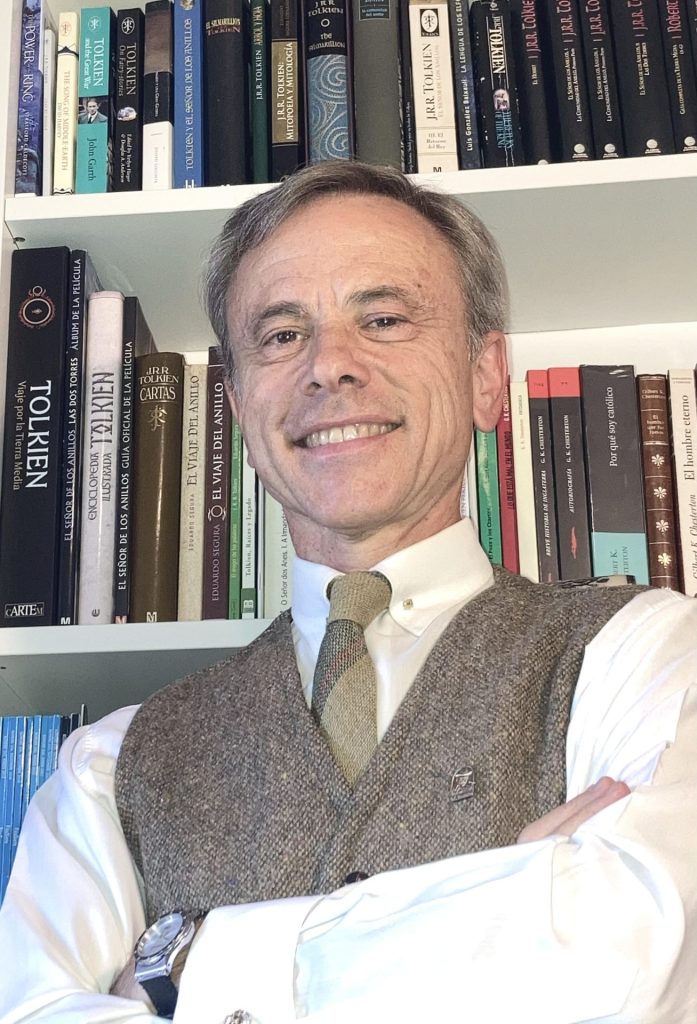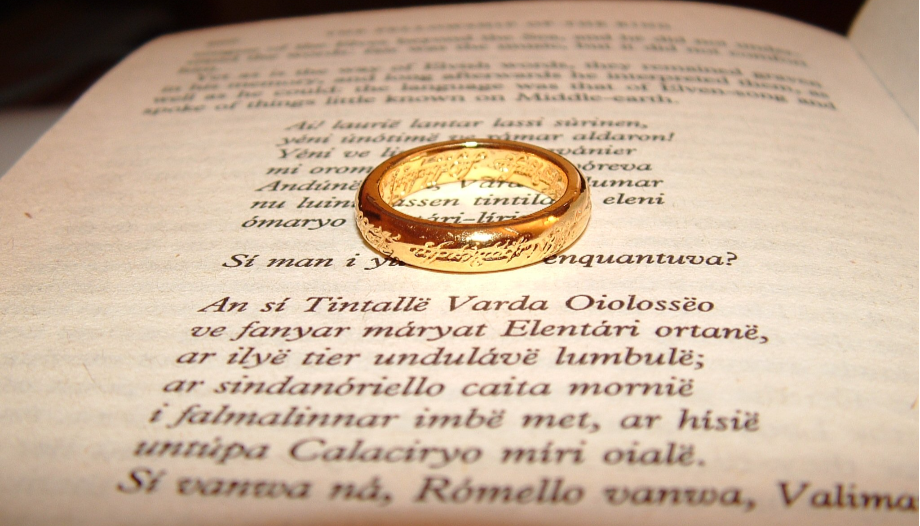Although it is unfortunately common to associate J. R. R. R. Tolkien with the "freak" phenomenon, the truth is that Ignacio Saavedra's approach to the English writer's work has always been in the hands of the Academy.

In 1994 he attended a lecture on Tolkien given at the Complutense University by Professor of Greek Carlos García Gual, who ended his presentation by presenting the audience with a recording of the Oxford professor's voice singing in the Elvish language one of the more than one hundred songs that appear in "The Lord of the Rings". This was the inspiration for Professor Saavedra to create, years later, the musical theater group Endor Lindë (the music of Middle-earth).
As a student of Journalism at the University of Navarra, he was pleasantly surprised to find that the professor of Contemporary Literature included "The Lord of the Rings" in the list of required readings, along with authors such as Thomas Mann, Marcel Proust or Franz Kafka. Shortly afterwards he had the opportunity to meet personally the professor of Theology at the same university, José Miguel Odero, author of the first serious study on Tolkien published in Spain.
The most expensive series on television, in which Amazon has invested more than 200 million euros, has just premiered.
ーThere is no exact figure on the cost of the series. A recent article published in The Wall Street Journal puts it at $750 million not including the marketing campaign.
It narrates events well before the famous sagas of "The Hobbit" and "The Lord of the Rings". How is the series being received by the English writer's followers?
ーThere is a wide range of opinions about the series among Tolkien fans. For many it is quite a betrayal of the writer. The problem is that, when reading opinions, it's hard to know how much of it is thoughtful criticism and how much of it is taking advantage of the series to dump all the accumulated hatred against Jeff Bezos and his empire over the last few years. And to complicate matters further, there is the obsession on the part of many people to see a manifestation of the ideology of "woke"everywhere.
There is a sector of deep connoisseurs of Tolkien's work who have decided not to give their opinion until a certain number of chapters have been released, but they have already expressed their liking for certain dialogues that, in their opinion, are a true homage to the deepest and most positive elements of Tolkien's work.
Finally, let's not forget that Amazon has invested heavily in entertaining opinion leaders to try to get them to publish favorable opinions of the series. What everyone agrees on is that the high investment shows: dazzling sets, rapturous music and careful execution down to the smallest detail to provoke an irresistible attraction in the viewer.
Why is Tolkien's work considered Catholic if the characters do not have a religious rite?
ーIt would be a topic for an entire congress, but the question would become quite clear if there were not so many Catholics who are engaged in intellectual work and who still have not read the Letter of St. John Paul II to Artists. Catholicity is not that the stories have a moral so that the story can be a vehicle for catechesis. Catholicity is that Beauty leads us to God as the only possible origin of such ineffable beauty. When an artist is as authentic as Tolkien was, when he is not a simple wordsmith who knows the tricks to turn a story into a best-seller, the work created reflects the whole inner world of the artist, including the Catholic worldview, if any.
It could be said that Tolkien could not avoid being noticed that he was Catholic, but he tried to prevent the public from drawing any parallels between his stories and the History of Salvation. The problem is that there is a fairly large sector of the Catholic public who have some idea of the Biblical Story but know nothing of mythology and, for example, see in Galadriel a reflection of St. Mary but do not see a lot of characters from various mythologies that could also be an inspiration for the character of Galadriel.
This presumed catholicity is noticeable in details that go far beyond whether there are rites or not. It is noticeable, for example, in the conception of human freedom reflected in the behavior of the characters. It is noticeable in how the story conveys, in a mythopoetic way, that we are all obliged to be very careful with Nature because Nature is a gift from God. This idea began to be connatural among Catholics after the promotion of "Laudato Si", but it was revolutionary when "The Lord of the Rings" was published.
The spiritual beings created by Tolkien in "The Silmarillion", Valar and the Maiar, to what extent is the nature of these beings influenced by your Catholic theological vision?
ーIt's hard to say to what extent, and I wouldn't say that they are spiritual beings, just like that. They are beings endowed with special powers, but not exactly spiritual. It is normal that, observing the behavior of Gandalf, turned protector and guide of Frodo in the fulfillment of his mission, believers think of angels or archangels, but that kind of especially powerful beings, who use that power in the service or against mortals, are so well in other religious, mythological and literary sources from which Tolkien was nourished.
The elves devised by Tolkien do not die, and consider death a gift. Gandalf tells Frodo not to kill Gollum. Considering these two facts, what is your opinion of Tolkien's sense of hope?
ーI must clarify that elves do die, and they died at the time when they had to battle against the hosts of Morgoth. These are big questions, which would give not for a doctoral thesis, but for several doctoral theses. In fact, one of the last doctoral theses on Tolkien defended at the Spanish University is centered precisely on this idea: death as a gift.
That conversation in which Gandalf praises Bilbo's compassion, because "not even the wisest knows the end of all roads" has been what has caused many readers to become staunch enemies of the death penalty. Hope is one of the great themes of Tolkien's work. Not for nothing is the journal of the Spanish Tolkien Society called ESTEL, a word from the Elvish language meaning hope.
Many things could be said about what hope is like in Tolkien's work, but a central idea is that, at bottom, there is not such a great difference between elves and humans. The hope would come from the fact that humans have the gift of death, yes, but they also enjoy a spiritual immortality because their works survive. That survival, in many cases, means being present in songs that speak of times past, which for me is a mythical way of expressing that death is not something definitive.
The convert Evelyn Waugh saw the Second Vatican Council as a betrayal of tradition, which is perhaps true of many people in other historical moments as well. What was Tolkien's perception of the Council?
ーAs far as is known, there was only one aspect of Vatican II that he did not like: the decline of Latin. There are several reasons why Tolkien had a special appreciation for this language. One is that it was one of the first languages he studied, under the guidance of his own mother, who taught Greek and Latin to Tolkien and his brother, during a season when she failed to enroll them in any school.
A second reason why he was hurt by what happened to Latin after the council is that Tolkien was convinced that Latin was a great element of unity. We could say that the irruption of the vernacular languages to the detriment of Latin was perceived by Tolkien as a new version of the Tower of Babel. As a good philologist, he was well aware that a change of language implies a change of thought, which implies a diversity of interpretations of doctrine and, therefore, a risk of disunity.
Lewis and Tolkien, two literary greats with different Christian visions.
ーThe relationship between Tolkien and Lewis is a passionate subject. As any connoisseur of the lives of both writers knows, it had a culminating moment in that walk through that part of Magdalen College called Addison's Walk, at Oxford University. Tolkien knew how to use their shared passion, the love of mythology, as a vehicle to show Lewis the way to God. It is a moment beautifully captured in a recent film, "The Most Reluctant Convert"about the life of C. S. Lewis.
But then two things happened. On the one hand, Lewis preferred to remain in the Church of England instead of opting for the "Roman" Catholic Church of his friend and university colleague. On the other hand, driven by his apostolic zeal, he created stories that were clear allegories of the faith, something Tolkien disliked. Also negatively influencing their friendship was Lewis's marriage to Joy Gresham, which Tolkien did not view favorably.
Did Tolkien have any relevant relationships with other Catholic writers?
ーIn the circle of professors and writers who used to meet in various pubs in Oxford - the famous Inklings - there was also Owen Barfield, whose Catholicism is still the subject of debate. He can be considered the founder of the Inklings, which would already be enough to consider him a decisive man in Tolkien's life.
It was at these Inklings meetings that "The Lord of the Rings" began to be read. It may even be that it was there that Tolkien became convinced that the now famous book was worthy of publication. Verlyn Flieger, one of the most renowned scholars of Tolkien's work today, has thoroughly researched Barfield's possible influence on Tolkien's work and is coming to some pretty strong conclusions. And there is no denying that Catholicism may have been a necessary element in that influence.
We Catholics are very much marked by the beginning of the Gospel of St. John, and the primacy of the Word. The Logos is the driving force of Tolkien's work. I do not think there is any case in which a story that is pure philology has ended up being so popular and, above all, so capable of changing the vision of life on the part of its readers.








